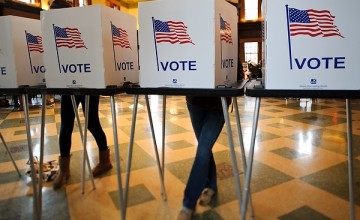
Four Maine citizens filed a lawsuit late last week against Secretary of State Matthew Dunlap, Attorney General Aaron Frey and Governor Janet Mills over the use of ranked-choice voting (RCV) in the upcoming November general elections.
The lawsuit alleges the ranked-choice voting system disenfranchises voters by substantially reducing full voter participation in Maine elections through ballot exhaustion and forces voters to associate with candidates they do not support in order to ensure their vote remains counted through the final round of tabulation.
The four plaintiffs, Robert Hagopian of Madison, Duane Lander of Greenville, Sterling Robinson of Warren and James Trudel of Hermon, are asking the court to suspend the use of ranked-choice voting in Maine elections before November.
In the lawsuit, the plaintiffs make four primary arguments: Maine’s RCV Act violates their right to vote, their right not to speak, their right to due process and their right to equal treatment under the law.
As it relates to the first argument, plaintiffs contend RCV violates their right to vote because they risk not having their vote counted if they do not rank enough candidates for their ballot to be a “continuing ballot” as defined in Maine’s RCV regulations. “Anyone who fails to mark enough candidates is at risk of having his ballot ‘exhausted’ and his vote ‘not counted’ in the election round that ‘determines the winner,’” the suit states. That risk burdens plaintiffs’ “right to have one’s vote counted.”
The suit uses data on full voter participation to make this argument. In plurality elections, full voter participation requires making a valid marking on your ballot for one candidate. In RCV elections, full participation requires ranking enough candidates to ensure your ballot is counted in the final, determinative round. The suit argues that in the average plurality election in Maine, the full voter participation rate is 97 percent, whereas in RCV elections, voter participation rates hover between 35 and 47 percent.
The RCV system violates voters’ right not to speak because, as previously explained, a voter must rank all candidates except one to ensure their vote is not exhausted by the final round of counting. This forces voters to associate with candidates whom they otherwise would not associate, or compels their speech in support of candidates they do not truly support.
Due Process is violated, the suit states, because voters do not have any notice or opportunity to cure an exhausted ballot. “The risk of erroneous deprivation is magnified by the lack of pre-deprivation process. Maine exhausts voter ballots without any notice or opportunity to cure, let alone notice that is “reasonably, calculated, under all the circumstances, to apprise” affected individuals of the deprivation…”
Finally, the plaintiffs are denied equal treatment under the law through the process of counting and tabulating RCV ballots. In each round of RCV voting, voters who voted for losing candidates have their votes shifted to different candidates for subsequent rounds. However, candidates who support just one candidate have their vote “locked in” to their first-choice candidate and do not have the ability to shift their electoral support to other candidates without associating with candidates they do not truly support.
Those who fail to achieve full participation are at risk of having their ballots exhausted while other voters, typically younger, better educated voters are permitted to continue. Research cited in the suit from Nolan McCarty, a professor of politics and public affairs at Princeton University shows, using cast ballot data, that Maine municipalities with lowest levels of educational attainment and highest levels of elderly populations exhaust ballots at higher rates than the rest of the state.
Data compiled in Maine Policy Institute’s 2019 report, “A False Majority: The Failed Experiment of Ranked Choice Voting” was used to perform this analysis.
The full complaint can be read here.
A ruling in favor of the four Maine plaintiffs would prevent the use of ranked-choice voting in Maine’s upcoming general election, and likely future elections in both Maine and other jurisdictions.
"choice" - Google News
July 27, 2020 at 11:43PM
https://ift.tt/3g3xg5e
New lawsuit seeks to end the use of ranked-choice voting in Maine - The Maine Wire
"choice" - Google News
https://ift.tt/2WiOHpU
https://ift.tt/3c9nRHD
Bagikan Berita Ini














0 Response to "New lawsuit seeks to end the use of ranked-choice voting in Maine - The Maine Wire"
Post a Comment